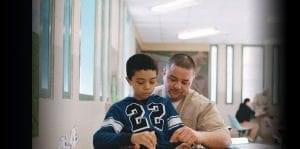
Midway through Tre Maison Dason, a documentary that views adults in prison through the eyes of their children, 6-year-old Dasan Lopes’s mother, Stephanie, sits down with him, his 9-year-old cousin, Alivia, and social worker TeLisa for an important talk. It’s the kind of family conversation that will surely resonate with the two children for the rest of their lives.
She asks both kids if they’re ready to hear about something serious, something that might be hard to handle. They both agree, and Stephanie explains to them that she was not away at school for several years, as the children were told, she was actually in prison. The revelation sinks in with the two youngsters, and Dason is full of questions, especially about what she did that caused her to be imprisoned.

“His mom admits to them that she had a dispute with the next-door neighbor and set fire to their house.”
His mom admits to them that she had a dispute with the next-door neighbor and set fire to their house. Hugs and tears follow. Dason is upset at the thought of his mother being sent to prison. But his unconditional love, a central theme of the film, is evident. Although this documentary, shot in Rhode Island, is about the hardships, guilt and pain associated with having a parent incarcerated, the film is really about families, and how these parents’ dedication to their children didn’t stop, even when they were behind bars.
Of the three boys, Tre, Maison and Dasan,, some are luckier than others when it comes to living a stable life with a supportive and well adjusted guardian. Tre, 13, lives with his drug addicted mother, and their household is predictably the least stable of the three. Kerry, his mother, asserts little authority over him and the two squabble and scrap like adolescent siblings. His father, Tyree, who is serving time in prison, does his best to keep Tre on the straight and narrow, and he does seem genuinely concerned about his welfare. Tyree sees Tre falling into the same patterns that he did as a youth. Tre has had a number of scrapes with the law, and is on probation. Father and son both muse about their respective anklet monitors, Tyree, seeing the dark humor in it, points out that “this isn’t normal” that a father and son are having this conversation.Yet somehow we understand that Tre is getting from his dad in prison the kind of support and unconditional love that he never seems to get from his mother.
Maison, the third boy, visits his father, Manny, who is serving time for taking part in an assault that resulted in a death. He has lucid conversations with the extremely eloquent 11 year old, who is profoundly hyperactive and extremely bright. He’s been diagnosed with Asperger’s Syndrome, and like many kids with this diagnosis, Maison has a quick mind, especially for math. He lives with his grandma, Shirley. His mother has moved to California, saying that it’s better for both her and Maison that she relocate to the other coast. Mason takes the separation in stride, displaying an emotional maturity beyond his years. He says that after he finishes school he’ll have the option of moving to California to live with his mother, but is content living either in Rhode Island or California.

“…until the powers that be find answers a vast number of kids will continue to live in purgatory.”
Each of the three boy’s stories are different, but the pain and sadness they bear is the common thread among them. Both Dasan and Maison seem to be holding up pretty well, but Tre’s future seems to be in doubt. Near the end of the film, when asked whether or not he thinks he’s nice or bad, he thinks a bit and replies that he’s nice on the inside but maybe bad on the outside. He ends up in a group home, awaiting adoption by a foster family.
Filmmaker Denali Tiller points out that this is not a “homeless to Harvard” story, it’s about more typical children who are living with a tremendous stigma and whose futures may not be bright. And the story may be a more common occurrence than many of us would believe. The film flashes on the screen at the end of the film a sobering statistic: 1 in 14 kids in America have had a parent in prison. That’s an awful lot of kids who may be living a marginal existence through no fault of their own.
The film offers no plan for improving circumstances for these children, it simply gives us a fly on the wall view of what disrupted lives a significant number of young ones live in this country. As for rehabilitating a sad situation such as this, it seems that until the powers that be find answers a vast number of kids will continue to live in purgatory.

Tre Maison Dasan (2018) Directed by Denali Tiller. Starring Maison Teixeira, Tre Janson, Dasan Lopes.
8 out of 10


I have seen this documentary twice now and it truly breaks my heart for these young boys and what they have been and are still going through, especially when it comes to Tre. Tre has been dealt a horrid hand in life and his story has brought me to tears each time I have seen it. I truly pray that all 3 of these boys find their ways to a better life and finally get to see what a real stable, secure and happy life looks and feels like one day, soon I hope. Every single one of them needs and deserves it. No child should ever have to go through what these boys have had to go through…it’s not fair. I also hope that when these parents finally get home to their kids, that they STAY HOME and actually realize that life isn’t about them anymore…It’s about those children!